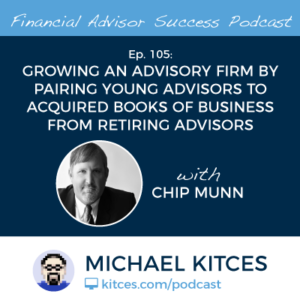For larger (or even mid-sized) advisory firms, bringing on additional back-office and support staff is just a normal part of the ongoing growth process. But for the solo advisor who may be starting to approach (or has already hit) a capacity wall and needs some operational help, hiring that first employee is a huge decision. Because, in one fell swoop, that once-solitary practitioner has not only suddenly doubled their business’s headcount (from you to two!), but they’ve also just given themselves a whole slew of new responsibilities as an employer that, no matter how good they are at delivering great advice to their clients, they may have little to no experience in.
Because, once you have employees, you have to figure out the best way to keep them challenged and motivated, and how to financially reward them while keeping their interests aligned with those of the business.
For many firms, the easiest way to accomplish that goal is by doling out bonuses, and so in this week’s #OfficeHours with @MichaelKitces, my weekly broadcast via Periscope, we discuss the pros and cons of various employee bonus structures, why sometimes monetary/financial rewards are less than optimal, and why it’s important to remember that business owners and employees aren’t always challenged and motivated by the same things.
Because our industry has its roots in product sales and commissions, the most common bonus structure is to share in the “sales” to new clients by sharing a percentage of new client revenue… where any new revenue that’s generated is split amongst advisors and the support team in such a way that recognizes their various levels of participation in the process of generating that revenue in the first place.
However, as the advisory industry shifts from upfront commissions to ongoing recurring revenues (e.g., AUM fees), firms that are hiring often have even more recurring revenue than new revenue, and it’s equally important for employees to not just help get new clients and revenue but retain the existing clients and revenue as well. Consequently, another approach for bonuses is to base them on a percentage of the firm’s gross revenue instead of off new revenue from new clients. Which not only rewards team members when the firm grows by adding new clients, but motivates them to work hard and provide great service to retain existing clients, too.
The caveat, however, is that in a business model that aims to create and increase annual recurring revenues over time, percentage of revenue bonuses – whether tied to new or gross revenue – have the potential to become quite large after a number of years, and can even compound to the point where they end up hindering the firm’s ability to reinvest into the business itself. Which, in turn, has prompted some firms to adopt a fixed-dollar bonus based on measurable (but not always static) business goals that can be adjusted over time based on ongoing firm growth and staffing needs, and (importantly) structured in such a way that manages employee expectations and keeps them focused on supporting the ever-evolving goals of the business (which naturally change over time).
Of course, bonuses don’t have to be monetary at all, as financial rewards on top of base salaries may be motivating initially but can become less so over time once employees begin to expect them as just another (implicitly-guaranteed) piece of their compensation, especially for otherwise-successful firms that regularly hit their bonus targets anyway. Instead, firms can offer experiential rewards for the whole team (and even their families!), which can often be a better sustaining motivator for people whose work requires creativity and original thought anyway.
Perhaps most significantly, though, is simply that advisory firm business owners must remember that their motivators are often quite different from their employees, who might actually respond much better in an environment that offers stability in compensation and job security (rather than risk-based upside potential). Because, if they were interested in taking the types of business/career risks that offered big potential upside as well as the possibility of many sleepless nights, then they would likely have chosen a different path in the first place!
Ultimately, though, in a world where it’s hard enough to find reliable and trustworthy employees in the first place, it only makes sense that one of the most important tasks when hiring that first employee is to figure out a bonus structure that works for them (as well as the ongoing needs of the business)… rather than just the one that you personally might find appealing as an employer!

 Welcome back to the 105th episode of Financial Advisor Success Podcast!
Welcome back to the 105th episode of Financial Advisor Success Podcast! Welcome back to the 104th episode of Financial Advisor Success Podcast!
Welcome back to the 104th episode of Financial Advisor Success Podcast!
